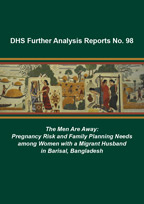- PUBLICATIONS
- JOURNAL ARTICLES
- ACCESS PUBLICATIONS
Publications Summary
- Document Type
- Further Analysis
- Publication Topic(s)
- Family Planning, Fertility and Fertility Preferences, Gender
- Country(s)
- Bangladesh
- Survey
- Bangladesh DHS, 2014
- Language
- English
- Recommended Citation
- Khan, Rasheda, Kerry L. D. MacQuarrie, Quamrun Nahar, and Marzia Sultana. 2016. The Men Are Away: Pregnancy Risk and Family Planning Needs among Women with a Migrant Husband in Barisal, Bangladesh. DHS Further Analysis Reports No. 98. Dhaka, Bangladesh and Rockville, Maryland, USA: National Institute of Population Research and Training (NIPORT), International Center for Diarrhoeal Disease Research, Bangladesh (icddr,b), and ICF International.
- Download Citation
- RIS format / Text format / Endnote format
- Publication Date
- March 2016
- Publication ID
- FA98
Download
 The Men Are Away: Pregnancy Risk and Family Planning Needs among Women with a Migrant Husband in Barisal, Bangladesh (PDF, 1024K)
The Men Are Away: Pregnancy Risk and Family Planning Needs among Women with a Migrant Husband in Barisal, Bangladesh (PDF, 1024K)
Download this publication
There is no printed copy available to order.
